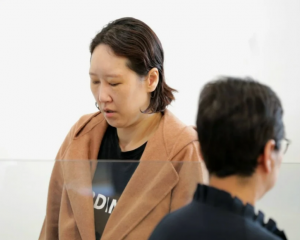Battered women who kill their abusers could face lesser criminal charges under proposals outlined by the Law Commission.
In releasing an issues paper today, the commission proposed that a new, specific homicide defence less culpable than murder could be created for domestic violence victims.
It also recommended reform of self-defence laws and better training of lawyers and the judiciary because of persistent myths around family violence.
Justice Minister Amy Adams asked for a review of the laws around victims who commit homicide earlier this year as part of a broader plan to reduce domestic violence rates.
Around half of all homicides in New Zealand were related to family violence. While most of them were committed by people with a history of aggression, some were carried out by long-suffering victims of abuse - usually women killing their male partners.
Lead commissioner Wayne Mapp said criminal laws on homicide might not adequately recognise the position of victims of family violence.
When victims committed homicide, they were often acting in response to years of physical, sexual and psychological abuse. These victims were usually charged with murder, Dr Mapp said.
"This area of the criminal law is complex and raises difficult questions," he said. "It is crucial that we hear from all interested parties. We need to know what people think about these important issues."
One of the most high profile cases in New Zealand was that of Christchurch woman Gay Oakes, who unsuccessfully used Battered Woman Syndrome as a defence after she killed her husband in 1993. She drugged Douglas Stuart Gardner until he overdosed and buried him in the backyard, later telling a court he had abused her for years.
The commission identified three main areas for reform - self-defence, partial defences, and addressing myths around family violence.
In a briefing paper, it said the law of self-defence had developed in a way which was unfairly excluding abused victims from relying on it.
The courts had interpreted self-defence to mean that a person had to be responding "proportionately" to an "imminent threat".
These requirements were difficult to reconcile with the nature of domestic violence, which was often not an imminent threat but ongoing and cumulative.
The commission recommended statutory reform, clarification of the existing test, or the introduction of a new provision which applied to victims who took defensive action out of necessity.
The briefing paper also recommended changes in the area of partial defences, which reduced murder to manslaughter when a killing was excusable, but not wholly justified. It said a partial defence could be needed to recognise the reduced culpability of someone who killed their abuser other than in self-defence.
There were no partial defences available to domestic violence victims since the Government revealed the provocation defence in 2009.
An alternative to a new partial defence could be a specific homicide offence for victims who retaliated against their abuser.
The commission underlined that the repeal of provocation had not led to harsher outcomes for victims in homicide cases. But it was arguable that the law should recognise the lesser culpability of people who killed abusers other than in self-defence.
The commission's investigation also found that myths and misconceptions about family violence continued to persist in the criminal justice system. These included the belief that a person could put an end to violence by simply leaving an abuse relationship.
It said these myths could mean victims were receiving inequitable treatment before the law, and recommended new prosecution guidelines and training for staff about the dynamics of family violence.
The commission's report cited 23 cases in the last 15 years in which an abused person had killed their attacker. One of these was Jacqueline Wihongi, who at the time of her sentencing was one of only three murderers not to receive life imprisonment. She was sentenced in 2010 to eight years' jail but after a Crown appeal this was raised to 12 years.
Court of Appeal judges said life imprisonment was not appropriate because mental impairment was a factor in her offending. They described her as a battered defendant who had reacted in an extreme way to her abusive partner of 17 years.
She had been sexually abused from age 14, prostituted by her partner's brother, and gang raped.
The Law Commission is seeking feedback on the proposals before December 18, and would produce a report for the Government in March next year.
By Isaac Davison of the New Zealand Herald










